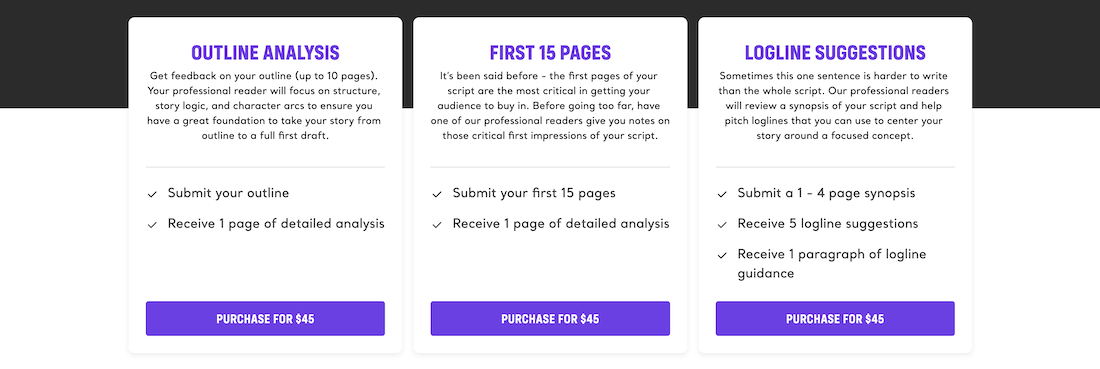How To Be a Pro Screenwriter Without Representation

Navigating Hollywood as a professional screenwriter without representation isn't impossible. Actually, you can create a successful screenwriting career without it.
Trust me. I’ve been doing it for nearly almost 20 years. I’m a professional screenwriter with no representation. And this is how
The Early Years as a Screenwriter
I had a manager at one time years ago, from 2005 to 2008. The relationship was outstanding—and it led to multiple meetings at Disney, Dreamworks, Universal, Sony, and Warner Brothers, as well as a development deal with Lionsgate from 2007 to 2008 (like most studio development deals, it wasn’t renewed due to the economic collapse and Writers Guild strike).
After the strike, the spec script market crashed as Hollywood became much more risk-averse. My manager and I went our separate ways.
I’ll double down on unlikely success stories by also sharing that I moved two thousand miles away from Hollywood to my home state of Wisconsin in 2005 so my wife and I could raise our son (now sons) close to family. I flew back to Los Angeles when needed while I was represented. So, beyond the first few months, my relationship with my manager was a long-distance one.
Today as a Pro Screenwriter with No Representation
Let’s fast forward to the present times. I’m a professional screenwriter with earnings in the six figures via eight (soon-to-be nine) produced and distributed feature-length films (OK, one of them was a 250-minute miniseries) currently available on platforms like Amazon, Hulu, Apple, and Lifetime. I am also currently under two back-to-back contract deals for my next Lifetime thrillers.
I’m what I call a blue-collar screenwriter. I’m not working with the major studios or streamers (yet). And I’m not earning six figures per script (yet). But I’m earning—and my scripts are being produced and distributed for all to see.
And, yes, I’ve done this all while representing myself:
- I’ve never had an agent or manager set up any of my meetings or contract negotiations.
- I’ve never had an entertainment lawyer look over my contracts.
- I’ve never used any type of representation to communicate between me, the directors of my projects, the producers of my films, or the production and distribution that greenlit them.
- Oh, I’ve also never met my direct contact—the SVP of the company—in person. Heck, we’ve never even spoken to each other on the phone (yet). It’s all been through email.
I declare all of this not to boast. I’m just sharing these career details with you because they are far from what most would expect. And even better… they can give you hope.
Read More: When Should Screenwriters Try To Get Representation?
 Debunking the Screenwriting Representation Myth
Debunking the Screenwriting Representation Myth
Make no mistake, I’m not anti-representation. Far from it. If you can get a legit agent, manager, and entertainment lawyer, go for it! They open doors for you. Heck, if I had an agent or manager, I’d have even more open doors for me.
I’m just here to tell you that you don’t need them to be a professional screenwriter.
When I use that term—professional (pro) screenwriter—I’m referring to someone like myself who is earning a consistent living (or at least a portion thereof) as a screenwriter. I have my side hustles. But I’m earning on a consistent basis as a screenwriter—likely more consistent than many screenwriters with agents, managers, and entertainment lawyers.
So, yes, it’s possible. I’m living and breathing proof. My IMDb credits may include silly titles like Psycho Intern, Hider in My House, The Podcast Murders, My Professor’s Guide to Murder, and The Neighbors Are Watching. But each had professional crews, professional actors, onscreen credits, major continued distribution, and I even had an amazing Duff sister direct two of my latest Lifetime thrillers (shout out to director Haylie Duff, who also starred in my first produced credit, the action thriller miniseries Blackout). Dog the Bounty Hunter even bookended my indie faith-based horror flick Hunter’s Creed.
Sure, the budgets, rushed deadlines, and niche target genres and demographics (yes, we know most of what we’re making) of these projects are more Roger Corman than Steve Spielberg. But, again, I’m earning. I’m also seeing my words come to life more than the average represented and Guild card-carrying (I’m non-guild, which I’ll cover in another post) screenwriter out there.
It’s possible to do all of this without representation.
Plenty of Production Companies Hire Unrepresented Screenwriters
Here’s a little-known fact: most legit production companies will work with unrepresented screenwriters. They don’t care. All they care about is the writing.
If you’re good at that, it doesn’t matter.
Sure, there are the top-tier companies that may insist you have representation before they can sign you to a contract. But underneath that top tier list are dozens upon dozens of legit production companies that produce movies in theaters and on all major platforms.
Many of these companies are non-signatory, which means that they are not required to hire Writers Guild members. The pay will be cheaper, but you’ll likely be working more than the average guild member.
 How to Be a Pro Screenwriter Without Representation
How to Be a Pro Screenwriter Without Representation
Before I pull the curtain away and offer some tips, please know that screenwriters like me are aplenty. However, that doesn’t mean it’s an easy type of career to attain. It’s really about hard work, great networking, being a desirable and fun collaborator, and a little bit of luck.
OK, how did I do it? Where to start?
Build Your Screenplay Portfolio
Whatever you can do to add to your portfolio will make all the difference:
- I worked as a movie extra after moving to Los Angeles from Wisconsin in 1999, just to get on set. This allowed me to say that I’ve been on Hollywood sets. I also got to meet a lot of the crew and learned how Hollywood sets are run. This experience worked as a great anecdote for later discussions with Hollywood insiders.
- I wrote for an entertainment website where I did interviews, movie reviews, and DVD reviews. This allowed me to work directly with major studio and network marketing divisions. I could then add that to my resume.
- I interned for Grease and Flight of the Navigator director Randal Kleiser where I learned how to write screenplay coverage.
- I became a security guard for Sony Studios for the sole purpose of getting onto a studio lot. This led to amazing networking opportunities I eventually leveraged to move into a studio liaison position working with incoming film/TV productions. I leveraged that position to move into a then-dream position of working in Sony Pictures development as a script reader/story analyst.
- As I mentioned above, I eventually had multiple meetings at almost all of the major studios. This is something that legitimized me as a writer in the eyes of Hollywood, even though no script sales came from those meetings.
When I say you need to build a Hollywood resume, I’m primarily talking about doing whatever you can that connect with a potential Hollywood contact down the road. All of these things I had done were talking points in my eventual studio meetings once I had a screenplay that was released. After those meetings, all of these things were pitching points in my cold query emails.
Before you say, “Well, I don’t live in Los Angeles so I can’t do that stuff,” let me say this. We’re in the 2020s. Anything is possible—and know that every single produced credit I have came while living and writing two thousand miles away from Hollywood.
Building a Hollywood resume of talking points isn’t a necessity by any means. But it increases your odds of breaking through.
Read More: 5 Reasons To Have True Story Screenplays in Your Spec Portfolio
 Have Plenty of Amazing Writing Samples
Have Plenty of Amazing Writing Samples
Writing samples are what will get you the job. Forget about selling a spec script. The hard truth is that it rarely happens in the big scheme of things. Even pro screenwriters can go a career without selling a spec.
The real bread and butter for pro screenwriters is writing assignments.
To get those writing assignments, you’re going to need to have three to five outstanding screenplays that showcase your abilities. Yes, the screenwriting must come first. You have to be worthy of the job in their eyes. And what proves that worth? Your samples.
Read More: Why Screenwriters Should Focus on Getting an Assignment Over Selling a Script
Be Friendly, Collaborative, Easy Going, and Confident with NO EGO
You don’t have an agent or manager to do the talking for you, so it’s all on you, my friend. This is probably the most important element of how to be a pro screenwriter without representation.
It doesn’t matter how good your writing skills are. If you are an egotistical jerk who is difficult to work with, you’re not going to get yourself hired. Also, if you’re not confident in your abilities (again, with no ego) and need your hand held throughout the whole process, you’re not going to last.
Understand Hollywood Contracts
Let me debunk another myth for you. Hollywood contracts are not that difficult to understand. Most of them are fairly straightforward. Heck, most companies use the same core contract content.
Always read through each and every line of a contract. If you don’t understand something, look it up online or ask the company to elaborate. It’s really not that difficult. Read the above link where I explain all of the terms.
Again, I’ve never had an agent, manager, or entertainment lawyer reviewing my contracts and explaining them to me. I’ve had ten of them now. If I can understand them—anyone can.
Read More: Contract Sample and Breakdown for Features
 Only Work with Legit Companies
Only Work with Legit Companies
All you need to do is look them up on IMDb and see their credits. If their films or TV series haven’t been released on major platforms, it’s not worth it. Plain and simple. Forget InkTip. Forget other paid services that get you on lists that “insiders” read. Look the company or individual up. If they don’t have legit credits (and recent ones, mind you), they’re not going to be worth your time and efforts, no matter what they promise.
Be a Good Negotiator
Most of the companies you’ll be dealing with will have contract constraints. They’ll only be able to pay you so much. You can’t expect Writers Guild of America minimums—although those can be benchmarks in negotiations with some companies.
In all of my deals, I've never been taken advantage of in any way, shape, or form. You have to be able to smell a scam a mile away.
Most reputable companies will have all the necessary contracts in place, drafted by their own lawyers to fit the specifics of your negotiated deal. For smaller indie films that might not have such resources, it's crucial to be smart and choose your collaborators wisely. Never work without a contract.
Don’t be scared to ask for more. But also be realistic, knowing they don’t have an endless budget.
Read More: How to Negotiate a Screenwriting Contract Without Representation
Be Able to Pitch Yourself and Protect Yourself
That’s what representation does. Since you don’t have any, you need to do it for yourself.
Get yourself to the point where you can pitch your projects and ideas with ease. It’s really not that hard.
- Know how to elevator pitch so you can convey your ideas easily.
- Master the ability to write an outline because that’s where the collaboration starts.
- Know your strengths in the most humble of ways.
Another myth to be broken is the notion that Hollywood is full of crooks who want to steal your ideas. That’s BS. Statements like that come from social media comments written by people not working in the industry.
Most Hollywood insiders are great people. They’re not looking to rip you off. Hollywood is very risk-averse. They don’t want to be sued. So if you find yourself dealing with people who aren’t living up to their promises and contracts, it’s likely on you for not vetting them properly. Again, only work with companies that have legit credits—many of them.
 ---
---
I’ll say this again. It’s possible to be a pro screenwriter without representation. I’m living and walking proof of that. It’s not easy to get to where I’m blessed to be today. But it’s not impossible either. Be able to sell yourself. Be able to sell your writing. And be able to prove you can do what it takes to be a pro screenwriter. Even one without representation.
And, hey, the added benefit is you don’t have to give away 10% per agent and manager (and 5% to an entertainment lawyer). More money for you.
Check out our Preparation Notes so you start your story off on the right track!

Ken Miyamoto has worked in the film industry for nearly two decades, most notably as a studio liaison for Sony Studios and then as a script reader and story analyst for Sony Pictures.
He has many studio meetings under his belt as a produced screenwriter, meeting with the likes of Sony, Dreamworks, Universal, Disney, Warner Brothers, as well as many production and management companies. He has had a previous development deal with Lionsgate, as well as multiple writing assignments, including the produced miniseries Blackout, starring Anne Heche, Sean Patrick Flanery, Billy Zane, James Brolin, Haylie Duff, Brian Bloom, Eric La Salle, and Bruce Boxleitner, the feature thriller Hunter’s Creed, and many Lifetime thrillers. Follow Ken on Twitter @KenMovies and Instagram @KenMovies76
Tags
Get Our Screenwriting Newsletter!
Get weekly writing inspiration delivered to your inbox - including industry news, popular articles, and more!


 Debunking the Screenwriting Representation Myth
Debunking the Screenwriting Representation Myth How to Be a Pro Screenwriter Without Representation
How to Be a Pro Screenwriter Without Representation Have Plenty of Amazing Writing Samples
Have Plenty of Amazing Writing Samples Only Work with Legit Companies
Only Work with Legit Companies
























